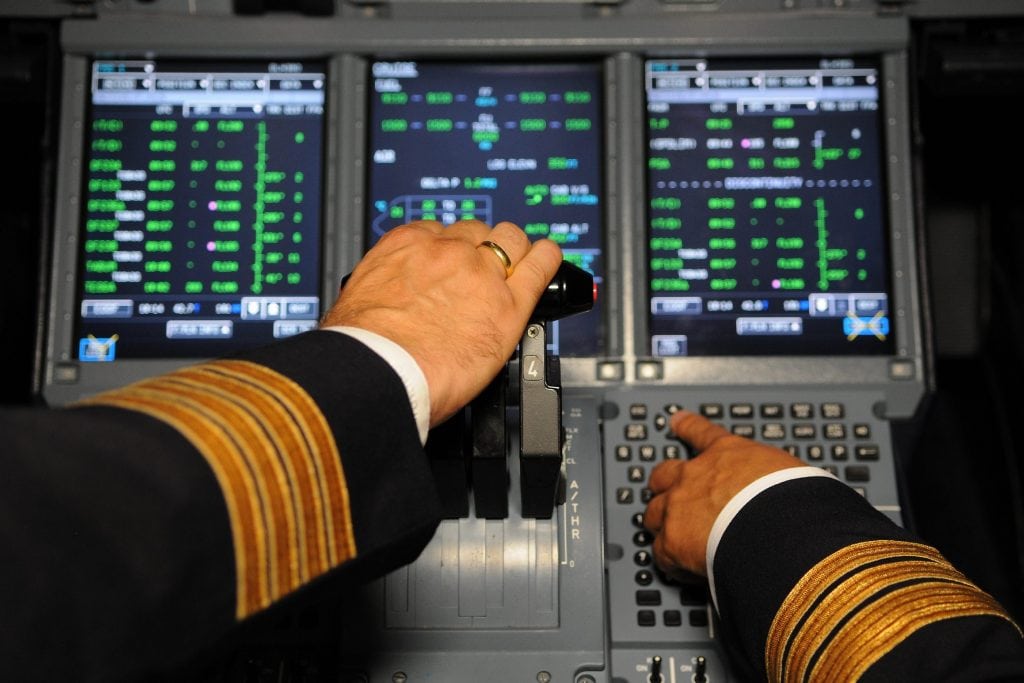Skift Take
Are there enough airline pilots to go around? There's no agreement on whether there's a crisis, but some airlines are at a greater disadvantage than others.
Global airline profits are expected to hit record levels in 2018 with passenger numbers rising by 6 percent.
This is great news for the aviation industry, but one problem gnawing at the optimism is finding enough pilots to fly the planes.
Expansion in China and elsewhere is putting pressure on established markets like Europe, where airline CEOs are beginning to take note.
Ryanair’s well-publicized struggles gave the issue further prominence. The Dublin-based carrier has always denied that it has a pilot shortage, but a rostering failure meant that it was forced to cancel 18,000 flights over the coming months.
“We are not short of pilots in Ryanair. There just was a temporary shortage on the standby front,” CEO Michael O’Leary said after the airline’s first-half results in October.
Ryanair isn’t the only airline to suffer from crewing issues. Norwegian had its own problems over the summer, which led to cancelations across its short-haul network. CEO Bjorn Kjos said after the company’s third quarter results that he expected the shortage would continue to affect the industry in 2018, although the problem might be alleviated by several airline bankruptcies.
“It depends on how many pilots will come out of Alitalia, and we know how many pilots have come out of Monarch and Air Berlin,” he said.
“Most of the Monarch pilots have gone to — or a lot of them are going to — Norwegian, and we are very happy for that because they’re very experienced pilots. That’s why we don’t foresee for ourself that we will have a shortage of pilots next year, as we speak. But since I’ve been into this game, there have always been ups and downs. Sometimes there have been an overflow of pilots.”
Kjos said the problem was likely to hurt those airlines that have big expansion plans in 2018. One such airline is low-cost carrier Wizz Air, which is taking advantage of Monarch’s recent demise, to open new routes from the UK.
“The pilot situation is tightening, so that’s putting inflationary pressure on the entire system. So it’s not only an issue of one airline. I mean, the tight market is affecting all the players in the marketplace. So pilots will become more costly, it will cost more to the company,” CEO József Váradi said after Wizz Air’s half-year results.
“We have to invest more into pilot trainings, into cadet programs and all those sort of things to start owning our own destiny as opposed to just being subject to the market,” Váradi said.
Low Cost Versus Legacy
Not everyone seems to be suffering. Looking at earnings calls from across the industry, it appears to be those at the low-cost end of the market that are having the biggest problems.
Earlier this year, Lufthansa settled a long-running dispute with pilots and CEO Carsten Spohr believes the issue is now firmly in the rear-view mirror.
“I think the pilot shortage is happening on the lowest end of the pay scheme and those that — who don’t treat their people fairly. As I always said, as a pilot in aviation, long term there is no shortcut,”Spohr said on an earnings call with analysts after the airline group’s third quarter results.
Willie Walsh, CEO of British Airways and Iberia owner International Airlines Group, is another executive who thinks the pilot shortage doesn’t exist or affect his company.
“On pilots, I started in this industry 38 years ago as a pilot. I heard then that there was a shortage of pilots. Thirty-eight years later, I still haven’t seen this,” he said on an earnings call following IAG’s third quarter results.
“We are not seeing any issue in terms of supply. All of our airlines are recruiting pilots. There’s plenty of capacity in the markets, good quality. We haven’t seen any issues. I don’t think anybody is, to be honest with you.
“I think the issues are specific to airlines that have pursued strong growth where they need captains,” Walsh said. “So it’s not a pilot issue. For some people, it’s being that they haven’t been able to get their copilots promoted fast enough to fill the left-hand seat, and that’s I think the bottleneck and it’s probably specific to a number of airlines.”
The Daily Newsletter
Our daily coverage of the global travel industry. Written by editors and analysts from across Skift’s brands.
Have a confidential tip for Skift? Get in touch
Tags: alitalia, lufthansa, Monarch, norwegian, pilots, ryanair, wizz air
Photo credit: An image from the cockpit of a Lufthansa aircraft. The airline ended a dispute with pilots earlier this year. Lufthansa
